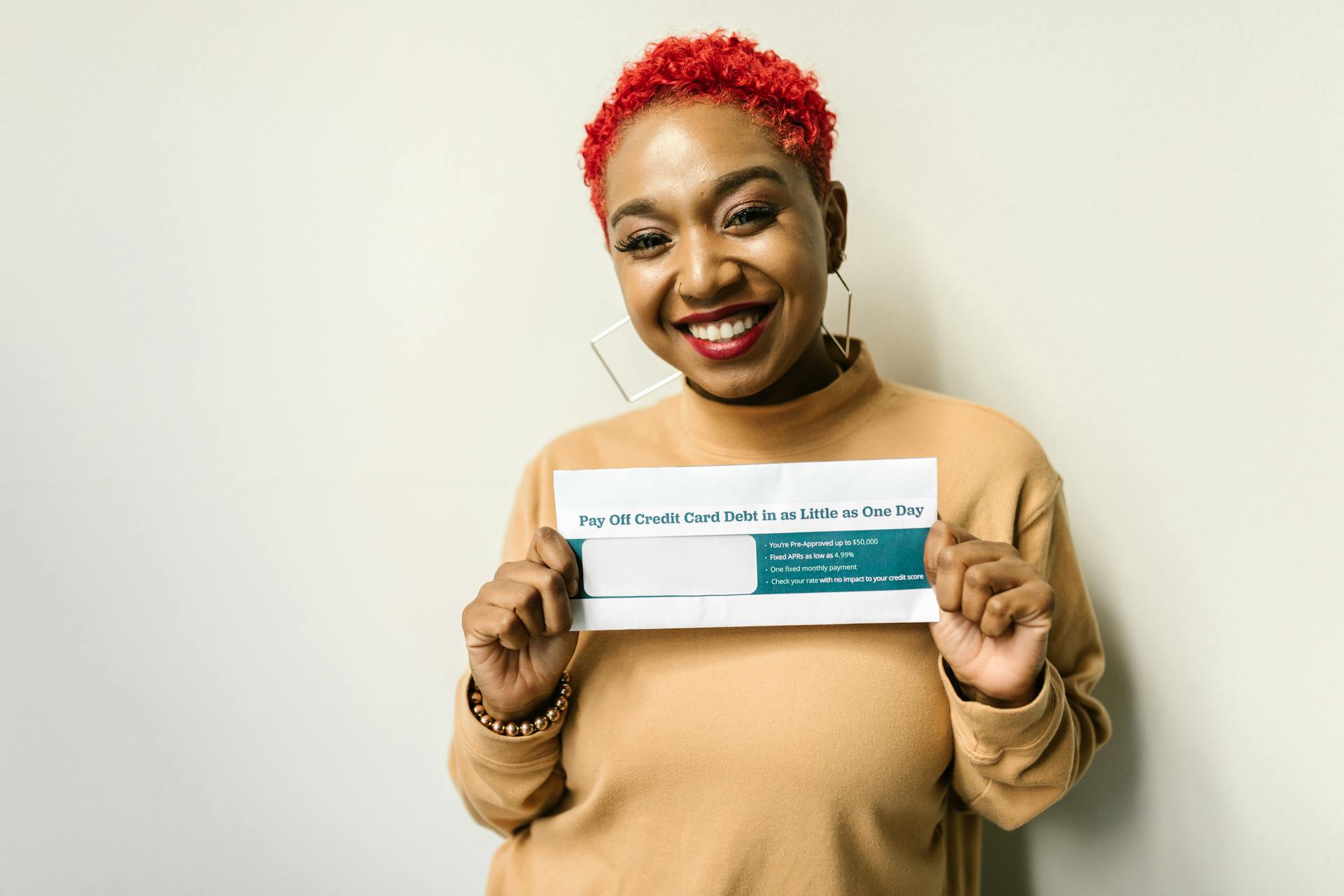
A consolidation loan is a type of loan that combines multiple debts into one single loan with a lower monthly payment and a longer repayment period.
By consolidating your debts, you can simplify your finances and reduce the stress of managing multiple payments.
Consolidation loans typically offer a lower interest rate than the original debts, which can save you money on interest payments.
This can be a huge relief, especially if you're struggling to make ends meet.
You might like: Direct Consolidation Loan Interest Rate
What is a Consolidation Loan
A consolidation loan is a type of loan that combines multiple debts into one new account with a single monthly payment.
This loan simplifies how many payments you have to make, and might offer a lower interest rate than what you're currently paying. Many lenders, including banks, credit unions, and installment loan lenders, offer consolidation loans.
These loans don't erase debt, but combining debts could reduce the number of monthly payments. If the new loan has a lower interest rate, it may lead to lower monthly payments.
Recommended read: Average Apr Financing Car
A debt consolidation loan might be a good idea if you're able to find a better APR or interest rate, lower your monthly payments, reduce how long it takes to pay down your debt, or use it responsibly to build your credit.
Some common forms of debt you may be able to consolidate include credit card debt, auto loans, home loans, and even medical bills.
Here are some potential advantages of consolidating debt:
- Find a better APR or interest rate.
- Lower your monthly payments.
- Reduce how long it takes to pay down your debt.
- Use it responsibly to build your credit.
Keep in mind that many of the low interest rates for debt consolidation loans may be "teaser rates" that only last for a certain time. After that, your lender may increase the rate you have to pay.
Check this out: Federal Student Loan Consolidation Interest Rate
Benefits and Advantages
Consolidating debt can be a smart move if you can find a better APR or interest rate, which can lower your monthly payments and reduce how long it takes to pay down your debt.
A debt consolidation loan can help you save money by paying off high-interest debts with a lower interest loan.
Having a single monthly loan payment can be a huge relief, especially if you're paying off credit card debt.
Consolidating credit card debt with a personal loan can help your credit by lowering your credit card balances and creating a higher ratio of available credit.
Paying off multiple lines of credit and/or debt using an unsecured personal loan with a lower rate can reduce your debt and lower your credit utilization ratio.
Making on-time payments on credit cards and other debts is critical, and a long history of consistently making payments on-time is good for your credit score.
Here are some key benefits of consolidating debt:
- Find a better APR or interest rate.
- Lower your monthly payments.
- Reduce how long it takes to pay down your debt.
- Use it responsibly to build your credit.
Application and Process
A consolidation loan can be a game-changer for managing debt. You can apply for a consolidation loan through a bank, credit union, or online lender.
The application process typically involves providing financial information, such as income and expenses, to determine your creditworthiness. This information is used to calculate your debt-to-income ratio and credit score.
You can expect the application process to take anywhere from a few minutes to a few days, depending on the lender and the complexity of your application. Some lenders may also require additional documentation, such as proof of employment or identification.
Additional reading: Small Business Administration Disaster Loan Application
How Does It Work?

The application and process for this topic involves a series of steps that are both automated and manual.
The system uses a combination of machine learning algorithms and human review to ensure accuracy.
Here's how it works: the user submits their application, which is then reviewed by a team of experts.
These experts verify the information provided and make any necessary corrections.
Once the application is complete and accurate, it's processed through the system.
The system checks for any discrepancies or missing information, and flags it for further review if necessary.
The entire process typically takes a few days to a week to complete.
Curious to learn more? Check out: What Is a Loan Application
How to Apply
To start the application process, check your rate online in minutes.
You can submit your debt consolidation loan application in just a few minutes.
On a similar theme: Apply for Student Loan Consolidation
Approach 3
When considering debt consolidation, it's essential to understand the different approaches available. One of the most popular options is credit card consolidation, which can provide a 0% interest rate for a specified introductory period.

This introductory period can be a game-changer, allowing you to budget smarter and pay off your high-interest-rate debt more efficiently. According to the article, this break in interest payments can help you plan and budget your life with more clarity and ease.
However, it's crucial to be aware of the potential risks involved. After the introductory period ends, the interest rate could increase dramatically, making it challenging to pay off the entire balance. Additionally, weigh any fees charged against the anticipated interest-rate savings.
To make the most of credit card consolidation, consider whether you can pay off the entire balance by the end of the introductory period. This will help you avoid high interest rates and fees down the line.
A fresh viewpoint: Home Equity Loan to Pay off Student Loans
Types and Options
There are several types of consolidation loans to consider, including personal unsecured loans, which can provide a fixed interest rate and help streamline debt payoff.
A personal unsecured loan may not be an option if your credit score doesn't meet a certain standard, which could be a drawback.
You can also consider credit card debt consolidation through a balance transfer or a loan, which might lower payments if the new interest rate is lower than the original credit card accounts.
Broaden your view: Nerdwallet Debt Consolidation Loan vs Paying off Credit Card Debt
Approach 2: Personal

If you have no home equity or other collateral, consider combining multiple debts into a personal unsecured loan. It can provide a fixed interest rate and help you streamline and structure your debt payoff.
A personal unsecured loan can be a good option if you're ineligible for a home equity loan or other secured loan. You'll need to meet a certain credit score standard to qualify.
Like a home equity loan, a personal unsecured loan can provide a fixed interest rate. This can make it easier to budget and plan for your debt repayment.
However, you could be ineligible for a personal unsecured loan if your credit score doesn't meet a certain standard. This can limit your options for debt consolidation.
A personal unsecured loan can help you combine multiple debts into one loan with a single monthly payment. This can make it easier to manage your debt and stay on top of your payments.
Take a look at this: Is a Consumer Loan a Personal Loan
Types and Options

There are several types of products that allow you to consolidate debt. Credit card consolidation is one option, which can help streamline high-interest-rate debt into a single monthly payment.
This type of consolidation often includes an introductory period of 0% interest for credit card balances transferred to the new card, giving you a break in interest payments that can help you budget smarter for the long run.
However, after the introductory period ends, the interest rate could increase dramatically, so it's essential to consider whether you can pay off the entire balance by the end of the period.
Credit card balance transfers are another option, which can help you consolidate multiple balances into one credit card account with a new card issuer.
Balance transfers usually generate a fee based on a percentage of the balance you're moving, which must be factored into your evaluation.
Some issuers may offer low introductory rates on credit cards, which can be a great option if you're in a position to pay off your debt quickly.
Additional reading: Discover Card Student Loan Consolidation

However, it's crucial to understand how the introductory rate works, including how long it applies and what rate will apply to any new charges you make.
Here are some key things to consider when evaluating a credit card balance transfer:
- How long introductory interest rates apply to transferred balances.
- Whether a different rate will apply to any new charges you make.
- How your rate could change over time—and what it could cost you—if you don’t pay off your debt.
- Whether there are any balance transfer fees.
- How a balance transfer could affect your credit.
Student Loans
Consolidating student loans might simplify debt management, but it's not always the best option.
Depending on the type of student loans, consolidating with one servicer or lender could offer more favorable loan terms.
However, consolidating federal loans could cause you to lose some benefits.
Consolidating student loans might end up increasing the total amount you owe or extending how long it takes to pay off everything.
Home Equity
Home equity loans and lines of credit can be a good option to pay off existing debt if you have equity in your home.
A home equity loan may offer a lower interest rate because your home is used as collateral, which could make it a more affordable option. However, this also makes it risky, as you could face foreclosure on your home if you can't pay back the loan.
Consider reading: Debt Consolidation Home Equity Loan
High closing costs are often associated with home equity loans, which can be a significant upfront expense. If you use your home equity for a loan, it might not be there if you end up needing it in an emergency.
A HELOC typically doesn't provide a clear path to eliminate debt due to its variable interest rate and revolving debt. However, some HELOCs may have a feature that allows you to convert your variable rate balance to a fixed rate with a fixed term, like a home equity loan.
Intriguing read: Equity Based Loan
Risks and Considerations
Taking on a consolidation loan can be a complex decision, and it's essential to consider the potential risks and challenges. Many people don't succeed in paying off their debt by taking on more debt unless they lower their spending.
Debt consolidation alone won't eliminate debt, and it's crucial to understand that it's just a way to simplify your payments. Simplifying payments may not necessarily make the payments lower each month.
Before taking out a debt consolidation loan, consider whether you're truly addressing the root cause of your debt. Taking on new debt to pay off old debt may just be kicking the can down the road.
There could be upfront fees, longer repayment terms, or other costs that make consolidation more expensive. Many companies that advertise consolidation services may actually be debt settlement companies, which often charge up-front fees in return for promising to settle your debts.
Here are a few things to keep in mind when considering whether debt consolidation is right for you:
- Debt consolidation won't eliminate debt.
- There could be upfront fees, longer repayment terms, or other costs that make consolidation more expensive.
- Simplifying payments may not necessarily make the payments lower each month.
Beware of debt consolidation promotions that seem too good to be true. Many of these companies may actually be debt settlement companies, which can be risky and charge up-front fees.
If this caught your attention, see: Best Payday Loan Debt Consolidation Companies
Frequently Asked Questions
Do consolidation loans hurt your credit?
Consolidation loans may temporarily lower your credit score by up to 5 points due to a hard inquiry, but the impact is usually short-lived. Your credit score should rebound within a few months if you manage your new loan responsibly.
Sources
- https://www.lendingclub.com/personal-loan/debt-consolidation
- https://www.prosper.com/personal-loans/debt-consolidation
- https://www.consumerfinance.gov/ask-cfpb/what-do-i-need-to-know-if-im-thinking-about-consolidating-my-credit-card-debt-en-1861/
- https://www.regions.com/insights/personal/personal-finances/managing-credit-and-debt/how-to-get-out-of-debt-through-consolidation
- https://www.capitalone.com/learn-grow/money-management/what-is-debt-consolidation/
Featured Images: pexels.com


